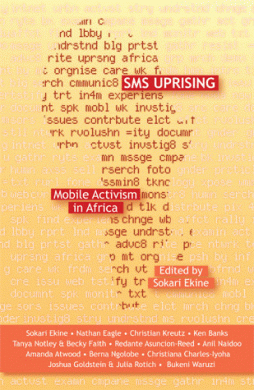fahamu
Posted by KatrinVerclas on Jan 12, 2007
Following on the heels of the BBC feature on the revolutionary growth and availablity of mobile phones in Kenya, OmyNews features a new project-to-be in South Africa's KwaZulu Natal province. The UmNyango Project of Fahamu, a MobileActive participant, equips rural women in the Province with free text messaging to report on violence against them and their children, and report other abuses. The project coordinator, Anil Naidoo, says: ""This is the first time in KwaZulu Natal that we know of, where SMS technology has been used to directly empower women in this way.
Posted by MohiniBhavsar on Aug 09, 2010
Mobile Activism or Mobile Hype? data sheet 2326 Views
Abstract:
Based on two experiences using mobile phones in Africa to address women’s rights and social development, the author tries to understand whether mobile technology will bring social progress to the economically poor of Africa.
The author first examines mobile phone use in the campaign for the Protocol on the Rights of Women in Africa, adopted by the African Union (AU)in 2003 and in need of ratification by 15 countries. The technical barriers to message transmission in the campaign and the message spamming that it attracted inhibited the success of this particular application of mobile technology but did not reduce the campaign effectiveness because the uniqueness of the cell phone campaign strategy drew a large amount of publicity for ratification.
In the second example, the UmNyango Project intended to promote and protect the rights of rural women in the province of KwaZulu Natal (KZN), South Africa, from domestic violence against women and landlessness amongst women. The project created "an SMS gateway through which messages could be distributed to all those enrolled in the project, and it enabled every individual to send messages to the organisers and to the local paralegal officers where they needed assistance with regard to any incidence of violence or threat to their access to land....In practice, the project found SMS to be prohibitively expensive, despite the fact that some level of subsidy was provided by the project towards the cost of SMS." The author states that, "Mobile phones, after all the hype, are like pencils, tools for communication.... Like all technologies, tools do not themselves do anything." He uses the example of SMS hate mail messages to support the position that effects of technology result from the underlying values and morals of its developers, not from the tools themselves, and concludes: "In capitalist societies, all technologies have the potential for magnifying and amplifying social differentiation. It is only through the imposition of the democratic will of citizens can this inherent tendency of technologies be overcome."
Posted by AnneryanHeatwole on Feb 10, 2010
SMS Uprising: Mobile Activism in Africa is a new collection of essays and case studies examining how SMS has been used in Africa for acticism. Essays include Amanda Atwood’s report on Kubatana’s experiences in Zimbabwe setting up mobiles as a means of sharing news outside of government propaganda, to Bukeni Waruzi’s essay on collecting data on children’s rights violations in the Democratic Republic of Congo in 2004. SMS Uprising is published by Fahamu, a British-based organization with a focus on information services for Africa.
SMS Uprising provides the reader with a decent understanding of the state of mobile SMS usage in Africa today. The essays are written by writers, developers, activists, and researchers who are committed to Africa, and cover a multitude of ways SMS can be applied for advocacy work – everything from alerts about political unrest to sharing health information. The book is divided into two parts: context and case studies.
Soukari Ekine, the editor, notes:
SMS Uprising is significant for many reasons not least because it has been edited by an African woman activist. Often initiatives in Africa are studied by people who are quite distant from the continent or are academics who are remote from the grassroots of the subject under discussion. The book is also unique in giving an insight into how activists and social change advocates are addressing Africa’s many challenges from within, and how they are using mobile telephone technology to facilitate these changes...The intention is that the information contained within the book will lead to greater reflection about the real potential and limitations of mobile technology.

